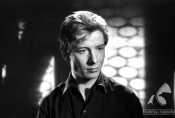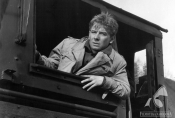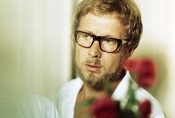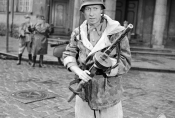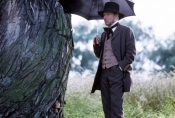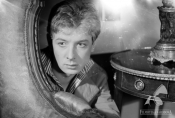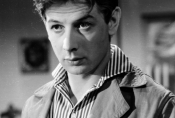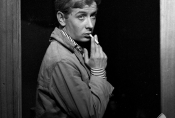Władysław Kowalski
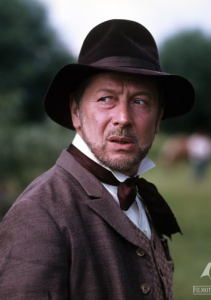
For a long time, he was cast in “boyish” roles. “Władysław Kowalski entered the world of Polish film as the Boy. He played a series of roles as young, inexperienced men on the cusp of adulthood,” Konrad Eberhardt, one of the greatest Polish film critics, wrote. One year later, the actor responded, “The label that stuck to me really bothered me and limited the scope of roles, preventing me from playing interesting, rich characters, necessary for my profession. That is why I do it all, to break free from that youth.” And he did, because the true art of acting consists of precisely overcoming being typecast.
He was born on February 24, 1936 in Żurawce near Tomaszów Lubelski. A graduate of the Acting Department of the State Higher School of Theatre in Warsaw (1957). After graduation, he joined the Wybrzeże Theatre in Gdansk (1959-1960), but later returned to Warsaw’s stages: Ateneum (1960-1974), Powszechny (1974-2005) and Dramatyczny (since 2005).
He debuted on screen in 1960, starring alongside Lydia Wysocka in Rozstanie/Parting by Wojciech Jerzy Has, the melancholic story of a woman returning to her hometown after many years. On the train, she meets Olek, a young boy, played by Kowalski. They spend the night together. In the morning, they will go their separate ways. He played a similar role in another, albeit completely different, film directed by Has, titled Złoto/Gold (1961), set in a large factory, where a young boy starts work. No one knows anything about him, and he remains quite mysterious. In the town, there is a man looking for him. It turns out that the boy had hit someone when driving on the highway at night, and is now running away from responsibility and punishment. The victim turned out to be ... a dog. Directors often – as in his case – typecast him because of his youthful good looks, offering him roles as sensitive, inexperienced boys. The most iconic character was Jerzy in the series Kolumbowie/The Columbuses (1970) by Janusz Morgenstern, based on the first two volumes of the popular novel by Roman Bratny.
A successful attempt to break the stereotype was Kowalski’s interesting performance as the doctor in Trzeba zabić tę miłość/This Love Must Be Killed (1972), also directed by Morgenstern, the careful portrayal of a young couple rather awkwardly entering their adult lives. Kowalski gave several excellent performances as mature men in subsequent films, including Filip, a friend of the main character, in Mniejsze niebo/Lesser Heaven (1980) by Morgenstern, the journalist in Bez miłości/Without Love (1980) by Barbara Sass, the father in Dreszcze/Shivers (1981) by Wojciech Marczewski, and the Commissioner in the Medium (1985) by Jacek Koprowicz. His greatest role from this period is Jakub Rosenberg, an intellectual trying to save his dignity at all costs, in Kartka z podróży/Postcard from a Journey (1983), the debut film by Waldemar Dziki, a poignant adaptation of the novel by Ladislav Fuks, set in the early years of the war behind the walls the ghetto.
Then came other, psychologically deep, portrayals of men in their prime, such as Władysław Janota-Czerkański (inspired by Kazimierz Junosza-Stępowski) in Oszołomienie/Daze (1988) by Jerzy Sztwiertnia, the doctor in Cynga (1991) by Leszek Wosiewicz, Ernst Ruppert in Sauna (1992), or one of the professors left on the sidelines in an abandoned railway carriage during the tragic events in Poznan 1956 (1998) by Filip Bajon. Also noteworthy is his role as professor “Alcibiades” in Spona (1998) by Waldemar Szarek, based on the famous novel by Edmund Niziurski. He gave several extremely poignant performances (even though they were cameo roles) in films by Andrzej Wajda – Jankiel in Pan Tadeusz (1999) and a professor of Jagiellonian University in Katyń (2007).
Selected filmography
-
1972
THIS LOVE MUST BE KILLED
reż. Janusz Morgenstern
-
1981
SHIVERS
reż. Wojciech Marczewski
-
1983
A POSTCARD FROM A JOURNEY
reż. Waldemar Dziki
-
1990
ESCAPE FROM THE 'LIBERTY' CINEMA
reż. Wojciech Marczewski
